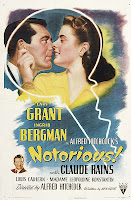 Several
famous sequences come to mind. The famous tracking shot that starts at the top
of the stairs, embraces the ballroom and ends on an extreme close-up of the key
in Ingrid Bergman’s hand (which is not even in the script, by the way). The
famous kissing scene that defied the censors who refused an on-screen kiss that
lasted more than 3 seconds: the two leads alternate kisses and speech in a
steamier way than a long uninterrupted kiss ever would have been.
Several
famous sequences come to mind. The famous tracking shot that starts at the top
of the stairs, embraces the ballroom and ends on an extreme close-up of the key
in Ingrid Bergman’s hand (which is not even in the script, by the way). The
famous kissing scene that defied the censors who refused an on-screen kiss that
lasted more than 3 seconds: the two leads alternate kisses and speech in a
steamier way than a long uninterrupted kiss ever would have been.
I’d like to
focus on more obscure aspects of the film, and on lost sequences.
 |
| Roy Webb |
Even now
that the most obscure works of contemporary composers like Bernard Herrmann or
Max Steiner are being released on CD, sometimes newly recorded, Roy Webb’s most
famous scores remain in the vaults. The only way to enjoy his marvelous music
for Notorious is available on the Blu-ray: it is the “international track”.
In order to
facilitate the dubbing process in foreign countries, a sound track with just
the music and effects mixed in was shipped abroad; the foreign dialog was
then recorded and mixed with this track. Time has not been very kind to it, but
it is a unique opportunity to enjoy the score.
 |
| Original credits |
The opening
scene of the film was originally slightly different: the point of view was that
of Alicia (Ingrid Bergman) and the two FBI agents watching her at the end of
the brief scene were Adams (played by William Gordon) and Devlin (Cary Grant).
Since the introduction of the character would be more efficient later in the
film, Devlin was replaced by a random FBI agent played by Frank Wilcox.
 |
| Original version with Cary Grant |
 |
| Deleted scene on lobby card |
The
love-hate relationship between Alicia and Devlin was even more explicit before
two scenes were cut. A scene explaining
Devlin’s sometimes cruel behavior towards Alicia took place while they were
preparing for the horse ride to meet Sebastian. It is Alicia’s very cold attitude
in this outtake that triggers Devlin’s reaction throughout the film.
Scene 351
took place in Paul Prescott’s office. Devlin asked him to be reassigned because the
situation became unbearable to him, therefore admitting a vulnerability not so
obviously expressed in other scenes. Since the whole dialog was shot in one continuous
take and Louis Calhern (who incidentally replaced Ray Collins in the role of Prescott) was not available anymore to re-shoot, the entire scene had to go when the censorship board asked for a line
about divorce to be cut.
 |
| Lenore Ulric at the party |
 |
| Deleted scene on lobby card |
 |
| Lenore Ulric visible in the distance |
 |
| Ulric & Moreno in an outtake |
The film was to be bookended by three brief scenes involving envious government office file clerks who bitterly discuss Alicia's change of marital status and leave of absence. They were very brief scenes but their inclusion in the film, had they not been deleted, would have given a very different tone to the ending of the film. One of these girls was Bea Benaderet (the voice of Betty Rubble in The Flinstones) and another was played by Virginia Gregg in her first part : she later voiced the famous mother in Alfred Hitchcock's Psycho!
I’d like to
finish this article with a little bit of trivia from Notorious:
 First of
all, the obvious height difference between Claude Rains and Ingrid Bergman was
partially hidden in their many scenes together by having Rains stand on a box or on stairs.
This is especially visible when they walk away from the camera and Rains
becomes smaller and smaller.
First of
all, the obvious height difference between Claude Rains and Ingrid Bergman was
partially hidden in their many scenes together by having Rains stand on a box or on stairs.
This is especially visible when they walk away from the camera and Rains
becomes smaller and smaller. An almost
casual indication in the script, at the
end of the scene where Alicia first sips some of the poisoned coffee, reveals
that what the old lady is sewing is actually Alicia’s shroud.
An almost
casual indication in the script, at the
end of the scene where Alicia first sips some of the poisoned coffee, reveals
that what the old lady is sewing is actually Alicia’s shroud.And finally, if the voice of Senator Walter Beardsley sounds somewhat familiar to you, it’s because the part is played by Moroni Olsen, the voice of the magic mirror in Walt Disney’s Snow White And The Seven Dwarfs.
More
pictures on A Lost Film Facebook page.
That’s all
for today folks!




I picked up on this interesting article nearly three years 'late", so it may no longer be possible to get any feedback from any questions I can come up with now, but was any of the cut-out footage-other than odd frames/lobby card pictures-retained in storage?
ReplyDeleteIt's never too late to discuss Hitchcock! As was customary then, the cut footage was very likely discarded. Even if it was stored some place at the time, RKO has ceased to exist so long ago that very little extra stuff remains of their productions, except for publicity material and of course, the films themselves.
DeleteThe music and effects track of this film still exists and is offered on Blu-ray, which is quite rare for an RKO release.